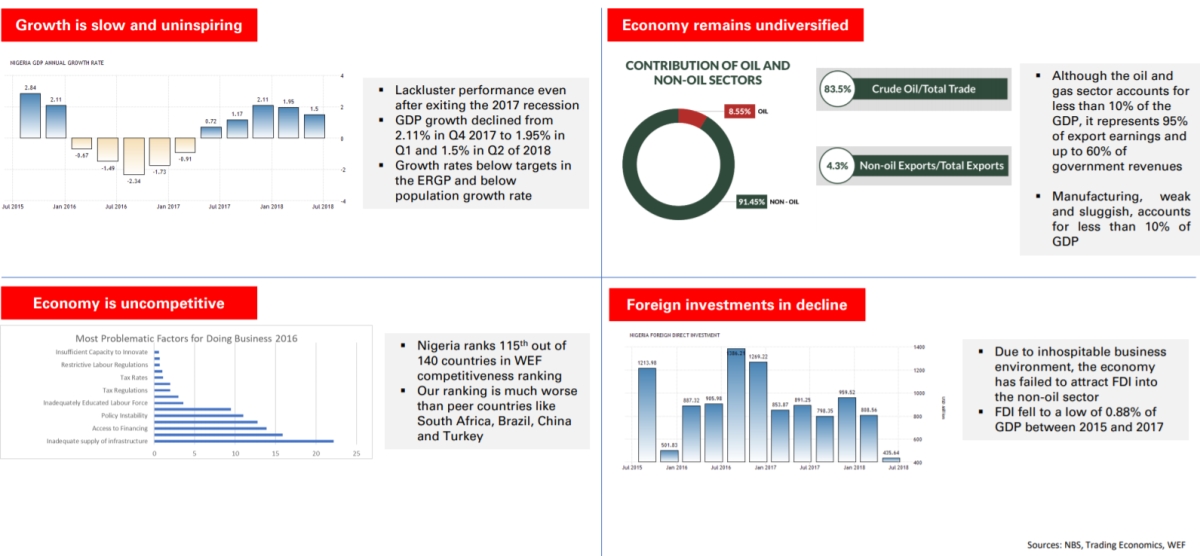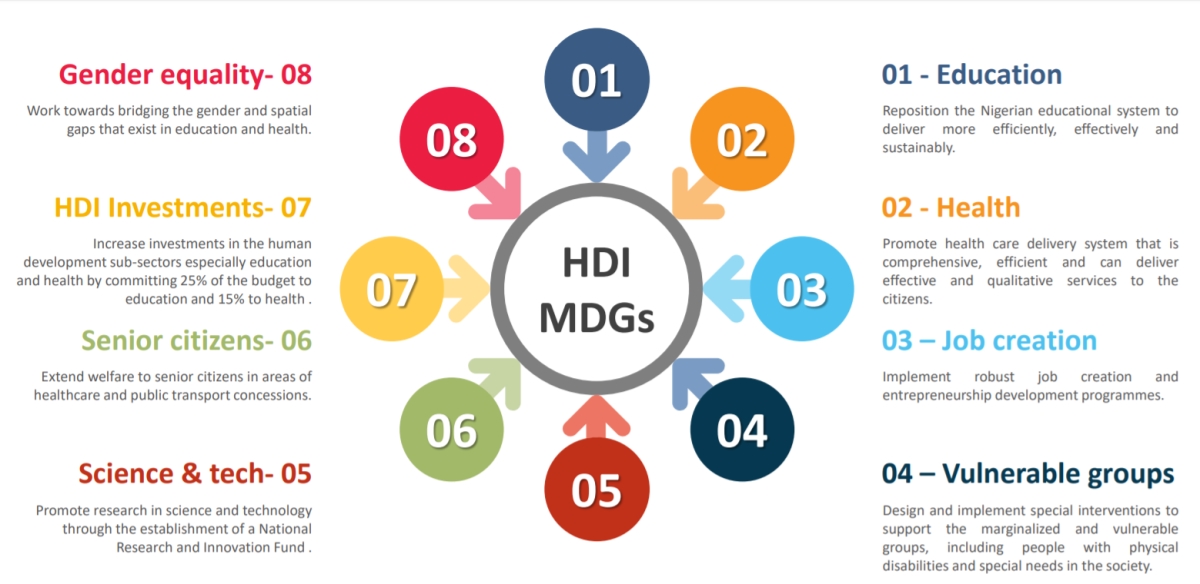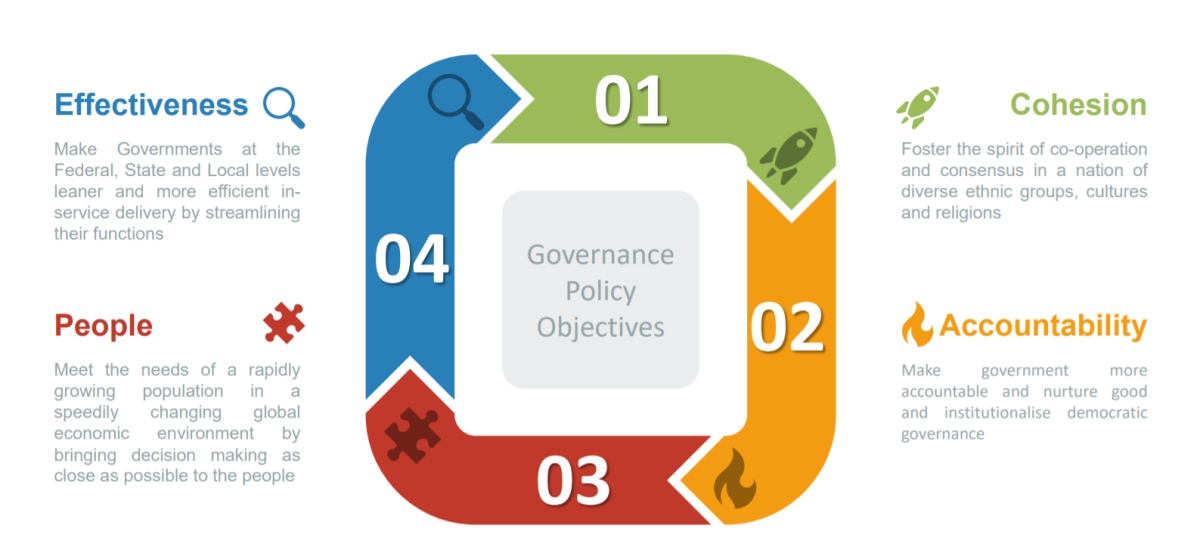Atiku was born to the family of Garba Atiku Abdulkadir and Aisah Kande of Jada in Adamawa State on November 25th 1946. He completed his primary school in Jada in 1960 and got admitted into Admawa Provincial Secondary School in Yola in 1961. Thereafter he enrolled into Ahamdu Bello University and graduated with a diploma in Law in June 1969.
Superintendent
Nigeria Customs Jun-1975
Co Founder
INTELS Integrated and Logistics Services Present
formerly Nigeria Container Services (NICOTES)
Co Founder
ABTI-ZARHAM Jan-1998
Parent Company of ABTI Nursery and Primary School, ABTI Academy, ABTI American University
Deputy Director
Nigeria Customs Apr-1989
Governor-Elect
Adamawa State Nigeria Jan-1999
Vice President
Federal Republic of Nigeria May-1999 May-2007
Atiku for President
Our vision is to transform Nigeria into a modern economy that works for its people and capable of taking its rightful place among the top 20 economies of the world. My economic policy will be job-centred especially for our teeming youth population
Nigeria can deliver. Nigeria can
surpass its own growth
expectations. Nigeria can realise
beyond its dreams. Our pledge to
the Nigerian people is:
TOGETHER WE CAN GET
NIGERIA WORKING AGAIN
Poverty Alleviation and Economic Empowerment
Social Welfare
Poverty does not simply have one
solution; rather it requires the
concerted application of many
solutions. Nigeria has vast natural
resources, but our challenge remains
harnessing these resources for the
greatest good
Provide skill acquisition opportunities and
enterprise development for job and wealth
creation, rather than direct cash distribution
Improve citizens’ access to basic
infrastructure services – water, sanitation,
power, education and health care
Remove all forms of discrimination against
the marginalized and vulnerable citizens and
enhance their access to education and
income generating activities
Implement pro-poor polices that will
enhance their participation in economic
activities and improve household income
Work more closely with NGO’s, the private
sector and other development partners to
mobilize resources for the effective
implementation of our empowerment
strategy
Agricultural Reform
Agriculture
Collaborate with
the States in the
design and
implementation of
robust and
sustainable land
reforms
Strengthen the
markets for
agricultural
commodities
Orderly
privatization of the
Nigerian
Commodities
Exchange
Improve
agriculture
sector’s access to
financial services,
through NIRSAL,
by de-risking
lending to the
sector by
commercial and
development
banks
Encourage
Investment in
Agro-processing
Cluster by offering
concessional
financing, tax
breaks and seed
funds
Improve farming
productivity
through
modernization and
mechanization of
small-scale
agriculture to
international
levels
Promoting the Manufacturing Sector
Business, Trade and ManufacturingEnsure that all major economic and
investment policies are formulated after
sufficient prior consultation with the
organized private sector
Work with the Manufacturers Association
of Nigeria (MAN), chambers of
commerce and other relevant
stakeholders to identify ways to reduce
the cost of borrowing, tackle incidences
of multiple taxation and improve
availability of foreign exchange for
legitimate production input purchases
Review of import duty on raw materials
that are available in the country and on
imported machinery for local production
Support and vigorously enforce the buymade-in-Nigeria initiative by ensuring
compliance with the relevant executive
order by Federal Government
Journey to industrialization procurement agencies
Promoting the New Economy
OtherEstablish a ‘Technology Support Programme’ (TSP) to be funded by a Diaspora Bond
Develop a more effective and efficient Intellectual
Property Rights (IPR) framework
Produce a comprehensive policy on blockchain technology and cryptocurrencies
Enhance ICT literacy initiatives from early school programmes to adult education
Provide the right incentives for the establishment of business units by global multinationals
Building the Economy of Our Dreams
Employment
Our youth are our most valuable resource… and charting new frontiers. Their entrepreneurial spirit, work ethic, and creative abilities are things of pride and should be applauded, encouraged and nurtured… I should know, I have thousands of them working for me all over the country.
Launch a new, more efficient, cost-effective and sustainable national Entrepreneurship Development and Job Creation Programme
Launch a new, more efficient, cost-effective and sustainable national Entrepreneurship Development and Job Creation Programme
Target the creation of up to 3 million self and wage-paying employment opportunities
in the private sector annually
Target all categories of youth, including
graduates, early school leavers as well as
the massive numbers of uneducated youth
who are currently not in schools,
employment or training
Create incubation centres, clusters and
industrial/commercial hubs to provide a
market place for MSMEs and SMPs
Champion the repositioning and
streamlining the activities of the existing
Federal and State Government Job Creation
Agencies
Poverty Alleviation and Economic Empowerment
Social Welfare
Poverty does not simply have one
solution; rather it requires the
concerted application of many
solutions. Nigeria has vast natural
resources, but our challenge remains
harnessing these resources for the
greatest good
Provide skill acquisition opportunities and
enterprise development for job and wealth
creation, rather than direct cash distribution
Improve citizens’ access to basic
infrastructure services – water, sanitation,
power, education and health care
Remove all forms of discrimination against
the marginalized and vulnerable citizens and
enhance their access to education and
income generating activities
Implement pro-poor polices that will
enhance their participation in economic
activities and improve household income
Work more closely with NGO’s, the private
sector and other development partners to
mobilize resources for the effective
implementation of our empowerment
strategy
Power Infrastructure
Power & Energy
There will be a decisive effort to
increase access to electricity for
Nigerians including those living in
rural areas
Allow NERC to perform its regulatory
functions without interference and guarantee
its independence
Review the Aggregated Technical,
Commercial and Collection (ATC&C) losses
existing in the power networks and extract
firm commitments for a revised ATC&C Loss
reduction target from the Distribution
companies
Create an environment that would enable
Distribution Companies recover full costs for
power supplied to their consumers
Introduce creative solutions towards
addressing the huge debt overhang and
liquidity challenge in the power industry
Ensure enforceability of industry contracts
Upgrade the transmission grid
Adopt short-term emergency measures
Infrastructure Development
Infrastructure
Establish an “Infrastructure
Development Unit” [IDU] in
the Presidency, with a
coordinating function and a
specific mandate of working
with the MDAs to fast track
and drive the process of
infrastructure development in
the country
Incentivize the private sector
to establish an Infrastructure
Debt Fund [IDF]. The IDF will
primarily mobilize domestic
and international private
resources for the financing and
delivery of large infrastructure
projects across all the sectors
of the economy
Broaden scope of Infra-Credit
to complement the operation
of the IDF by de-risking
investments in infrastructure
to build investor confidence in
taking risk and investing capital
Transportation Infrastructure
Transportation
Legislation, framework and regulation
overhaul
Develop 5,000km of roads by 2025 through
PPPs and community interventions
Develop and rehabilitate the connecting
road networks across the geo-political zones
Encourage transportation development
around the nation’s agricultural and
industrial clusters
Construct up to 5,000km of modern railways
through privatization, PPPs and public
investments
Improve existing port efficiency and achieve
accelerated development of alternative
container ports especially inland dry ports
Technology Infrastructure
Other
Implement a four-year plan for the
digitization of major government
operations such as procurement to
achieve transparency and reduce
leakages
Strengthen the use of business
intelligence software to analyse public
service productivity
Improve the technology start-up
ecosystem by providing financing and
infrastructure
Review, with timelines, partnership
agreements with experienced foreign
incubators and accelerators to improve
the penetration of technological
advancements in the country
Enforce and protect intellectual property
rights, which form a crucial component
in technological innovation
Housing Infrastructure
Housing
Closing the housing deficit
By 2025, we shall reduce the housing deficit to
less than 10 million houses from the current
deficit of 15 million
Long-term
Title, record and map all landed assets in the country
Review of the Land Use Act and the passage of a revised Land
Use Act that is more market friendly
Recapitalize the Federal Mortgage Bank
Strengthen the Nigeria Mortgage Refinancing Company (NMRC)
Medium-term
Improve the efficiency and operations of the National Housing
Fund
Promote private investment in housing
Support the states to digitalize their land registries
Enact appropriate foreclosure and securitization legislation to
mobilize additional housing finance
Short-term
Encourage home ownership by introducing tax incentives like
mortgage interest relief
Review pension fund investment guidelines to facilitate
enhanced pension fund involvement in provision of financing
Improve accessibility of citizens to long term housing finance
Education
Education
I truly believe that an educated
population forms the backbone for a
progressive and prosperous
society… education is the key to
unlocking opportunity, prosperity
and progress… education can and
should be this key.
Streamline functions and transfer of
responsibilities for greater efficiency e.g. by
2024, responsibility for funding and control
of public primary education shall be
transferred to the local governments
Develop and promote Science and
Technical Education to create skills for the
new economy
Improve access to qualitative as well as
industry-relevant education with access,
equity and quality receiving prominent
attention
Increase investment in social infrastructure
by the federal and state governments
Health
Health
No country can truly have
sustainable development without
strong healthy citizens to drive that
process. It is therefore the
fundamental right of every Nigerian,
no matter where they live, to have
unrestricted access to optimal and
affordable health delivery service.
Ensure a comprehensive reform of the
Federal Ministry of Health and its agencies
Accelerate Nigeria’s transition towards
achieving universal access to affordable and
quality healthcare services for all by 2030
Expand access to basic primary healthcare
Improve quality of care and clinical
governance
Unlock market potential of the health sector
by engaging the private sector
Encourage medium and large scale
pharmaceutical industries for the local
production of essential drugs
Expand healthcare professionals to the
frontline and attract Nigerian doctors in the
diaspora to reverse brain-drain
The Environment
Environment
Niger-Delta
The Niger-Delta accounted for over 85 percent of Nigeria's
annual revenues for the past 50 years, but still battles stark
under-development and continues to lag behind in almost every
key area of development.
We shall:
➢ Genuinely implement the Niger-Delta Master Plan
➢ Address the continued lack of infrastructure and social
services in the region
➢ Implement a variety of social awareness programmes
➢ Relocate the Niger Delta Ministry from Abuja to the
region to enable it become closer to the stakeholders
and beneficiaries
➢ Overhaul the Niger-Delta Ministry & NDDC to remove
overlaps and making them more functional
➢ Carry out a comprehensive review and impact
assessment of the Amnesty Programs
What we will do
Desert, Erosion and Insurgency-Ravaged
States
Northern states also battle infrastructure deficit, high levels
of unemployment, poverty and illiteracy as well as
frightening desert encroachment . We shall:
➢ Establish and operationalize the North East
Commission for Rehabilitation, Reconstruction
and Development
➢ Encourage industrialization in the region through
the development of clusters and dedicated
economic zones
➢ Develop and implement a security master plan
including security architecture overhaul and
greater border control collaboration with
neighbouring countries
➢ Develop and implement a social and re-integration
programme
Governance
Governance
The Nigeria of our dreams requires
cosmopolitan politics and an all
-
inclusive governance structure with
the essential capacity to harnesses
our diversity in a just and fair
environment where the rights of all
citizens are protected by a
transparent government that is not
just deliberate and purposeful but
conscious of its duty to the citizens
and its role and prestige in global
affairs
Restructuring
Other
All who support the calls for
restructuring our federation are
united in their desire to live in a
society that works better and works
for its people. They are also united
by their love for their country, their
patriotism. Those who do not love
their country would just want it to
break up; they would not be
interested in making Nigeria work
better
Decongest the exclusive and the concurrent list in
the constitution
The Central Government would also retain the role of
providing the required direction for the economy,
defense and national security, internal law and order,
currency, international affairs and foreign policy,
customs, citizenship and immigration, firearms, and
related matters
Issues bordering on minerals and mines, internal
security including Police, law and order, railways,
communications, transport, environment, land
matters, etc, would be devolved to the concurrent list
Local Governments shall become an independent
tier of government
Federating units will be supported in economic
management
Nigeria’s common resources will be shared equitably
in accordance with a new revenue allocation formula
to be negotiated across the board
Anti-Corruption and Rule of Law
Judiciary & Law Enforcement
Champion institutional reforms of anti-corruption
agencies and strengthening them for more effective
Launch a comprehensive National Anti-corruption
Strategy that is based on the rule of law, separation
of powers, neutrality and non-partisanship
Strengthen policies and measures for detecting
corruption through a strong technology infrastructure
that supports the end-to-end operations of
government businesses for transparency,
accountability, efficiency and effectiveness
Ensure that judgments on corruption cases are fully
followed through and enforced by the appropriate law
enforcement agencies
Review the reward system for public and civil
services
Strengthen anti-corruption public enlightenment
Enhance whistleblowing and witness protection
policies
Promote rule of law
National Security
Security
Our national security is multidimensional. It has gone beyond
armed defense to include protection
of democratic and constitutional
values like food security, peace,
human, political and economic
security. Resolving the unfair access
to democratic dividends to reduce
internal armed conflicts,
insurgencies, crimes and militancy.
Re-activate meaningful registration at birth as a way
to reduce crime and protect Nigerians
Conduct the next national population census as the
basis for further development planning
Dealing with insurgency using alternative
approaches to conflict resolution, such as Diplomacy;
Intelligence; Improved Border Control; Traditional
Institutions; and Good neighbourliness
Restructure and Decentralize Security Institutions
Promote Regional Security Cooperation
Resolve Militancy Issue in the Niger Delta
Improve Civil-Military Relations
Strengthen the National Security Council
Handle the North East Development Issues
Deal with Terrorism, Kidnapping and Other Crimes
International Relations
Foreign & Defence
Retool Nigeria’s foreign policy instruments
Re-activating the Presidential Advisory Council on
Foreign Affairs
Convening of an All-Nigerian Conference on Foreign
Policy to promote national consensus on our national
interest to guide foreign policy
Providing for a smooth and effective running of Nigeria’s
diplomatic missions
Implement the Diaspora Commission Act 2017
Strive to attain the level of economic success that should
qualify Nigeria to join the group of major decision-makers
on the direction of the global economy
Promote multilateral trade
Maximise gains of participating in ECOWAS
Enhance Nigeria’s visibility in the AU
Enhance Nigeria’s international visibility and improving its
image
Securing Nigeria’s leadership in world affairs
Curb the threat of illicit small arms and light weapons
Get Nigerians in the diaspora involved in nation building
Give an opinion about Atiku



